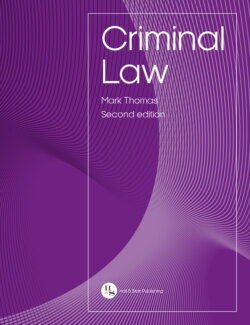Читать книгу Criminal Law - Mark Thomas - Страница 98
На сайте Литреса книга снята с продажи.
2.6.5.2Duty is absolved
ОглавлениеThe second circumstance is where the victim releases the individual from his duty to act, as opposed to the duty being passed on to another. This is a difficult concept to understand given the necessity for a rational and autonomous decision on the part of the victim who releases the individual from his duty. Some light was shed on this area by the first instance decision of R v Smith [1979] Crim LR 251, where the trial judge in the Crown Court suggested that if a rational decision is possible from the victim, such decision may lawfully remove the defendant from his duty to act. Specifically, Griffiths J directed the jury to consider the following:
If [the victim] does not appear too ill it may be reasonable to abide by her wishes. On the other hand, if she appeared desperately ill then whatever she may say it may be right to override.
A number of cases in the civil courts have determined that where a rational and mentally competent adult chooses to release someone from their duty of care, this must be legally adhered to. This is so even where it would be against the best interests of the party releasing the duty (Re T (adult: refusal of treatment) [1993] Fam 95; Re C (adult: refusal of treatment) [1994] 1 All ER 819; St George’s Healthcare NHS Trust v S [1999] Fam 26).
example
Jack is a prisoner who has spent the majority of his young life in prison. Jack is addicted to drugs and has a history of self-harm. Jack voluntarily decides to go on hunger strike and dies from starvation. A number of psychiatrists confirmed Jack to be mentally competent.
These were the facts of Secretary of State for the Home Department v Robb [1995] Fam 127. The Family Division of the High Court ruled that where an individual is competent to make a decision, his decision overrides all state interests, and the prison authorities were within their right to abide by his decision. In effect, the prisoner released the prison authorities from their duty to provide him with nutrition.
The cases listed above, however, are civil cases and thus not binding in criminal matters. But should a criminal case such as this come forward in the appellate criminal court, the decision would likely accord with that of the civil courts. The issue for the courts will be the whether the individual was acting in an autonomous and rational manner. Autonomy is considered in more detail in Chapter 7, but for an excellent discussion of autonomous decision making, see Herring, Medical Law & Ethics, 8th edn (OUP, 2020).
